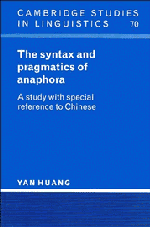Book contents
- Frontmatter
- Contents
- Preface
- Abbreviations used in glosses
- 1 A neo-Gricean pragmatic theory and anaphora
- PART I ANAPHORA IN GOVERNMENT AND BINDING THEORY
- PART II THE PRAGMATICS OF ANAPHORA
- 5 A neo-Gricean pragmatic theory of anaphora
- 6 Further applications of the theory
- 7 Anaphoric production in conversation
- 8 Anaphoric resolution in conversation
- 9 Conclusions
- Notes
- References
- Index of names
- Index of languages
- Index of subjects
9 - Conclusions
Published online by Cambridge University Press: 23 October 2009
- Frontmatter
- Contents
- Preface
- Abbreviations used in glosses
- 1 A neo-Gricean pragmatic theory and anaphora
- PART I ANAPHORA IN GOVERNMENT AND BINDING THEORY
- PART II THE PRAGMATICS OF ANAPHORA
- 5 A neo-Gricean pragmatic theory of anaphora
- 6 Further applications of the theory
- 7 Anaphoric production in conversation
- 8 Anaphoric resolution in conversation
- 9 Conclusions
- Notes
- References
- Index of names
- Index of languages
- Index of subjects
Summary
Study of performance relies essentially on advances in understanding of competence. But since a competence theory must be incorporated in a performance model, evidence about the actual organization of behaviour may prove crucial to advancing the theory of underlying competence. Study of performance and study of competence are mutually supportive.
Chomsky (1980a: 226)I shall now conclude by summarising the major findings of this book and discussing the theoretical implications of these findings for linguistic theory. The main contributions of this book, I think, are the following: (i) properties of anaphora in Chinese are characterised; (ii) inadequacies of Chomsky's GB theory to account for these properties are demonstrated; and (iii) a neo-Gricean pragmatic theory of anaphora is constructed.
Properties of anaphora in Chinese
Although our analysis has been developed in response to current syntactic and pragmatic theories, implicit in it is a general characterisation of the nature of anaphora in Chinese. Looked at from a relatively theory-neutral, descriptive point of view, anaphora in Chinese has the following properties:
(i) Zero anaphors occur extremely freely and often take preference over pronouns.
(ii) The use of pronouns is very much restricted.
(iii) Reflexives occur very freely and often take long-distance antecedents.
(iv) Lexical NPs are frequently used and are often repeated for an intended coreferential interpretation.
(v) The assignment of antecedent for anaphora is not so much restricted by grammatical rules as by pragmatic inferences.
(vi) There are precise parallels in the assignment of antecedent for reflexives, pronouns and zero anaphors.
(vii) There are precise parallels in the assignment of antecedent for intrasentential and discourse anaphora.
- Type
- Chapter
- Information
- The Syntax and Pragmatics of AnaphoraA Study with Special Reference to Chinese, pp. 257 - 262Publisher: Cambridge University PressPrint publication year: 1994



